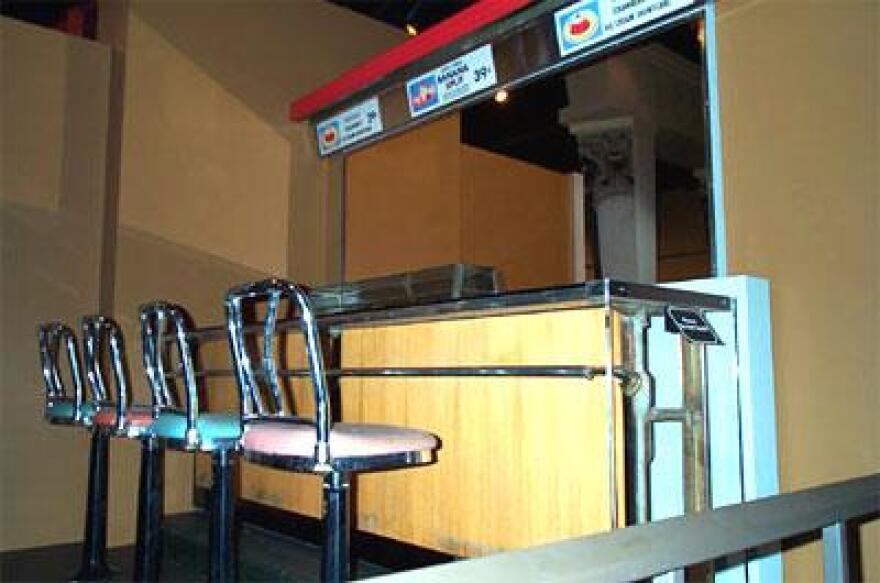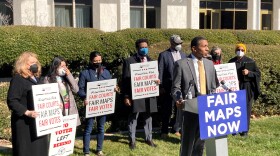Background to this first person audio story from reporter Jessica Jones:
Back in 2010, I was thrilled to cover the opening of Greensboro's International Civil Rights Center and Museum, housed in the old Woolworth's store where the famous sit-in took place that led to the end of desegregation.
It was exciting for me personally because the assignment allowed me to meet and interview three of the surviving members of the Greensboro Four, the men who as college students showed such incredible courage in integrating the lunch counter.
Franklin McCain was so calm and dignified as he described how he and the others sat in those swivel chairs, steeling themselves against the taunts, racial epithets, and splatters of ketchup hurled against them by angry whites.
One of the four, David Richmond, had died years before, but McCain, Joseph MacNeil, and Jibreel Khazan- formerly known as Ezell Blair- described in great detail how scary the experience was. As they spoke, I wondered to myself whether I could have mustered up that same kind of courage. I doubt it.
What I do know for certain is that hearing their stories made me think long and hard about how difficult it can be to take a stand and do the right thing- but someone has to make that choice. Franklin McCain and his friends did.
I am so sorry to hear that McCain is no longer with us. He was an inspiration.
Before the museum opened, the three men spoke at a conference about what led them to hold the sit-in.
Joseph MacNeil, who grew up in New York but attended North Carolina A&T with the others, said the final straw for him was the journey back to college after the holidays:
My parents lived in New York City at the time, and I was home on winter break. And I was coming back to North Carolina, and I was riding a Greyhound bus. And something strange started to happen to me after I left New York. I mean, I was the same person when I got to Philadelphia that I was on 125th Street, but it seemed that the further south I went, the more differently people started to view me. I had changed, boy, but they were changing. So by the time I got to Richmond, Virginia, and I was hungry, I went to a restaurant in the terminal and asked to be served. And they said 'We can't serve you here- you have to go around the corner there.' And for me, that was the final blow of humiliation. And I had had enough. And I made up my mind that I had to do something.
Jibreel Khazan [Ezell Blair] was the first to hear about MacNeil's experience:
Of course, I was Joseph's roommate, I was the mirror he'd bounce his ideas off of. Bing bing bing bing! 'All right Junior Blair, wake up!' 'Joe, what’s going on man?' 'You know what happened to me?' 'No what happened to you?' 'I came from Richmond Virginia, man, by the time I got to Richmond I felt like I was a slave, man.' (He walked all the way about a mile from the bus station at 11:30 and I was the guy who got the brunt of it. So I know exactly what he’s saying is true.) I said, 'Well, Joe man, what can we do?' He said, 'We got to do something man I’m so sick and tired of race discrimination.' He said, 'We have got to act man.' So about a week or so (later), Frank, David, and Joseph and myself in the room, we said, 'We have got to make some plans. What are we going to do? Time to act.'
Franklin McCain said before the sit-in, no one on campus would have pegged them as leaders.
We were seen as different. And if you were to ask people about Joseph McNeil, Franklin McCain, Ezell Blair [Jibreel Khazan], and David Richmond in 1960, people would say, you mean..them? Yes, them. Four of us- kind of coocoo, kind of crazy.
Everyone, including Jibreel Khazan [Ezell Blair], knew there were risks involved:
I was the one that didn’t want to go down on Sunday night January 31st, because I was worried about getting hurt. I went home and said: Mom, Dad, (I knew they were going to save me), no boy your grades are failing, no, boy, you better stay out of that.' But they went along with Frank and Joe! [They said], 'You go down tomorrow, we’ll say our blessings for you. Oh by the way, I want you to dress like you’re going to church.' [I said] 'I want to wear overalls. [She said] 'Who’s your mother?' [I said] 'You are.' [She said] 'You do what I tell you.' [I said:] 'Yes Ma. Okay. But suppose I get killed?' She said: 'You’ll be dressed to kill! Mothers are always right.
Joseph MacNeil told the crowd when the sit-in finally started, no one knew they were contributing to the start of a movement:
When we had these sit-ins and we faced the prospect of being arrested and going to jail, we didn’t know for how long it was going to be, or whether we were going to jail for one day or one week or six months or one year. We were students! But we were very serious students. We cared about life and our future. But we knew that we had to do this one stand. We had to take on this one thing. Good things started to happen early in that time when we were sitting down.
One elderly woman approached the four young men as they were sitting at the Woolworth's lunch counter that day:
She comes and sits next to McCain and she looks at him and says, Son, I’m disappointed in you.' And he looks back at her and says, 'Ma’am why would you be disappointed in me? You don’t know me, I don’t know you.' And the little lady said, "I’m disappointed at you boys because it took you so long."
But, MacNeil added, they all knew they had to make the sit-in happen:
The sit-in was not about Frank McCain, or Ezell Blair [Jibreel Khan], or Joe MacNeil sitting down and having a cup of coffee next to a white person. It was much deeper than that. It was about choice. It was about having the ability to say I choose to sit down. Or I choose to drink from that water fountain. I don’t choose black water or white water or colored water. I want water.
Franklin McCain said living under Jim Crow was so intolerable that he felt he had no other option but to seek an end to segregation:
I was not angry at people in particular. I was angry at a system that I thought betrayed me. It was a farce. And I credit my three colleagues- probably- with saving my life. Because deep in my heart, I felt as though if that was what life had to offer, then I'm not sure sure it's worth living.








